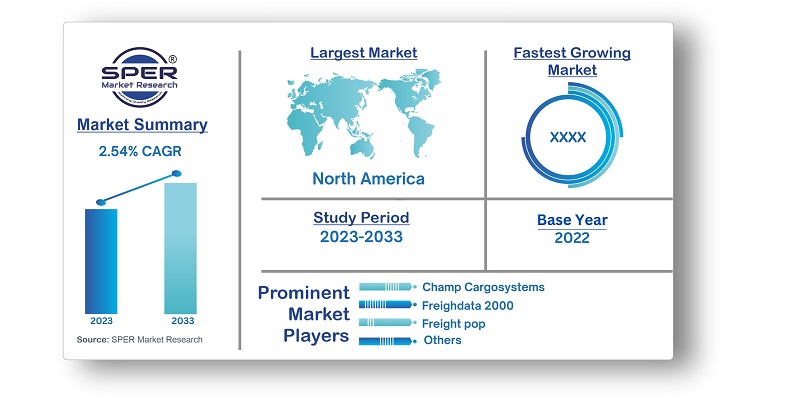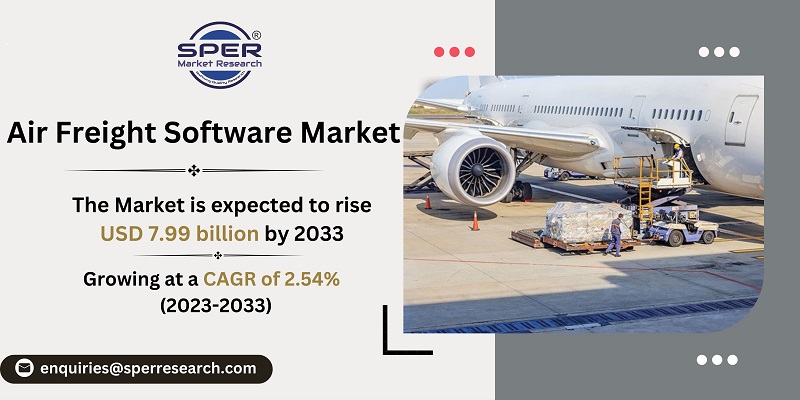
Air Freight Software Market Growth, Trends, Size, Revenue, Scope, Challenges and Future Outlook
Air Freight Software Market Size- By Deployment, By Air Freight Service, By Application, By End User- Regional Outlook, Competitive Strategies and Segment Forecast to 2033
| Published: Jul-2023 | Report ID: IACT23139 | Pages: 1 - 244 | Formats*: |
| Category : Information & Communications Technology | |||
- Globalization and International Trade: The ongoing expansion of international trade and globalization has resulted in an increase in demand for air freight. As more businesses engage in cross-border operations, the demand for efficient and dependable air freight software solutions to manage the intricacies of international shipping grows.
- Real-time Tracking and Visibility: Customers and businesses alike are demanding real-time tracking and visibility of their goods. Air freight software provides exact and up-to-date cargo status information, guaranteeing better transparency and dependability.


| Report Metric | Details |
| Market size available for years | 2019-2033 |
| Base year considered | 2022 |
| Forecast period | 2023-2033 |
| Segments covered | By Deployment, By Air Freight Service, By Application, By End User |
| Regions covered | Asia-Pacific, Europe, Middle East and Africa, North America, Latin America |
| Companies Covered | Champ Cargosystems, Freighdata 2000, Freight pop, IBS, Inform Software, Magaya, Riege Software, The Descartes Systems Group Inc, TMSfirst. |
- Freight Forwarders and Logistics Companies
- Airlines and Air Cargo Carriers
- E-Commerce and Retail Companies
- Customs Authorities and Regulatory Bodies
- Supply Chain Managers and Operations Executives
| By Deployment: |
|
| By Air Freight Service: |
|
| By Application: |
|
| By End User: |
|
- Global Air Freight Software Market Size (FY’2023-FY’2033)
- Overview of Global Air Freight Software Market
- Segmentation of Global Air Freight Software Market By Deployment (Cloud Based, On-Premise)
- Segmentation of Global Air Freight Software Market By Freight Service (Deferred Service, Expedited Service, Standard Service)
- Segmentation of Global Air Freight Software Market By Application (Delivery Tracking, Freight Handling, Freight Routing and Scheduling, Freight Tracking and Monitoring, Price and Revenue Management, Warehouse Management)
- Segmentation of Global Air Freight Software Market By End-User (Cargo Airlines, Commercial Airlines, E-Commerce Companies, Third Party Freight Service Providers, Others)
- Statistical Snap of Global Air Freight Software Market
- Expansion Analysis of Global Air Freight Software Market
- Problems and Obstacles in Global Air Freight Software Market
- Competitive Landscape in the Global Air Freight Software Market
- Impact of COVID-19 and Demonetization on Global Air Freight Software Market
- Details on Current Investment in Global Air Freight Software Market
- Competitive Analysis of Global Air Freight Software Market
- Prominent Players in the Global Air Freight Software Market
- SWOT Analysis of Global Air Freight Software Market
- Global Air Freight Software Market Future Outlook and Projections (FY’2023-FY’2033)
- Recommendations from Analyst
1.1. Scope of the report1.2. Market segment analysis
2.1. Research data source2.1.1. Secondary Data2.1.2. Primary Data2.1.3. SPER’s internal database2.1.4. Premium insight from KOL’s2.2. Market size estimation2.2.1. Top-down and Bottom-up approach2.3. Data triangulation
4.1. Driver, Restraint, Opportunity and Challenges analysis4.1.1. Drivers4.1.2. Restraints4.1.3. Opportunities4.1.4. Challenges4.2. COVID-19 Impacts of the Global Air Freight Software Market
5.1. SWOT Analysis5.1.1. Strengths5.1.2. Weaknesses5.1.3. Opportunities5.1.4. Threats5.2. PESTEL Analysis5.2.1. Political Landscape5.2.2. Economic Landscape5.2.3. Social Landscape5.2.4. Technological Landscape5.2.5. Environmental Landscape5.2.6. Legal Landscape5.3. PORTER’s Five Forces5.3.1. Bargaining power of suppliers5.3.2. Bargaining power of buyers5.3.3. Threat of Substitute5.3.4. Threat of new entrant5.3.5. Competitive rivalry5.4. Heat Map Analysis
6.1. Global Air Freight Software Market Manufacturing Base Distribution, Sales Area, Product Type6.2. Mergers & Acquisitions, Partnerships, Product Launch, and Collaboration in Global Air Freight Software Market
7.1. Global Air Freight Software Market Value Share and Forecast, By Deployment, 2023-20337.2. Cloud Based7.3. On-Premise
8.1. Global Air Freight Software Market Value Share and Forecast, By Air Freight Service, 2023-20338.2. Deferred Service8.3. Expedited Service8.4. Standard Service
9.1. Global Air Freight Software Market Value Share and Forecast, By Application, 2023-20339.2. Delivery Tracking9.3. Freight Handling9.4. Freight Routing and Scheduling9.5. Freight Tracking and Monitoring9.6. Price and Revenue Management9.7. Warehouse Management
10.1. Global Air Freight Software Market Value Share and Forecast, By End User, 2023-203310.2. Cargo Airlines10.3. Commercial Airlines10.4. E-Commerce Companies10.5. Third Party Freight Service Providers10.6. Others
11.1. Global Air Freight Software Market Size and Market Share
12.1. Global Air Freight Software Market Size and Market Share By Deployment (2019-2026)12.2. Global Air Freight Software Market Size and Market Share By Deployment (2027-2033)
13.1. Global Air Freight Software Market Size and Market Share By Air Freight Service (2019-2026)13.2. Global Air Freight Software Market Size and Market Share By Air Freight Service(2027-2033)
14.1. Global Air Freight Software Market Size and Market Share By Application (2019-2026)14.2. Global Air Freight Software Market Size and Market Share By Application (2027-2033)
15.1. Global Air Freight Software Market Size and Market Share By End-User (2019-2026)15.2. Global Air Freight Software Market Size and Market Share By End-User (2027-2033)
16.1. Global Air Freight Software Market Size and Market Share By Region (2019-2026)16.2. Global Air Freight Software Market Size and Market Share By Region (2027-2033)16.3. Asia-Pacific16.3.1. Australia16.3.2. China16.3.3. India16.3.4. Japan16.3.5. South Korea16.3.6. Rest of Asia-Pacific16.4. Europe16.4.1. France16.4.2. Germany16.4.3. Italy16.4.4. Spain16.4.5. United Kingdom16.4.6. Rest of Europe16.5. Middle East and Africa16.5.1. Kingdom of Saudi Arabia16.5.2. United Arab Emirates16.5.3. Rest of Middle East & Africa16.6. North America16.6.1. Canada16.6.2. Mexico16.6.3. United States16.7. Latin America16.7.1. Argentina16.7.2. Brazil16.7.3. Rest of Latin America
17.1. Champ Cargosystems17.1.1. Company details17.1.2. Financial outlook17.1.3. Product summary17.1.4. Recent developments17.2. Freighdata 200017.2.1. Company details17.2.2. Financial outlook17.2.3. Product summary17.2.4. Recent developments17.3. Freight Pop17.3.1. Company details17.3.2. Financial outlook17.3.3. Product summary17.3.4. Recent developments17.4. IBS17.4.1. Company details17.4.2. Financial outlook17.4.3. Product summary17.4.4. Recent developments17.5. Inform Software17.5.1. Company details17.5.2. Financial outlook17.5.3. Product summary17.5.4. Recent developments17.6. Magaya17.6.1. Company details17.6.2. Financial outlook17.6.3. Product summary17.6.4. Recent developments17.7. Riege Software17.7.1. Company details17.7.2. Financial outlook17.7.3. Product summary17.7.4. Recent developments17.8. The Descartes Systems Group Inc17.8.1. Company details17.8.2. Financial outlook17.8.3. Product summary
17.8.4. Recent developments
17.9. TMSfirst17.9.1. Company details17.9.2. Financial outlook17.9.3. Product summary17.9.4. Recent developments17.10. Others
SPER Market Research’s methodology uses great emphasis on primary research to ensure that the market intelligence insights are up to date, reliable and accurate. Primary interviews are done with players involved in each phase of a supply chain to analyze the market forecasting. The secondary research method is used to help you fully understand how the future markets and the spending patterns look likes.
The report is based on in-depth qualitative and quantitative analysis of the Product Market. The quantitative analysis involves the application of various projection and sampling techniques. The qualitative analysis involves primary interviews, surveys, and vendor briefings. The data gathered as a result of these processes are validated through experts opinion. Our research methodology entails an ideal mixture of primary and secondary initiatives.



Frequently Asked Questions About This Report
PLACE AN ORDER
Year End Discount
Sample Report
Pre-Purchase Inquiry
NEED CUSTOMIZATION?
Request CustomizationCALL OR EMAIL US
100% Secure Payment






Related Reports
Our Global Clients
Our data-driven insights have influenced the strategy of 200+ reputed companies across the globe.




















